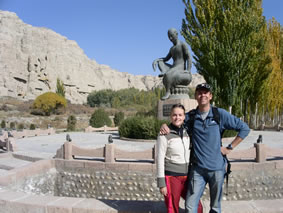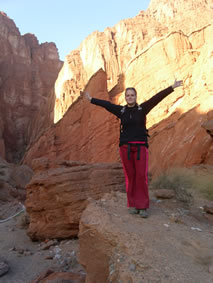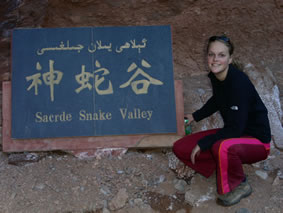A thousand buddha caves
A quick check of the car reveals something we don¡¯t want to see. All four new steeringbolt rubber have come loose! We feel horrible as we are almost sure we can¡¯t get them in China. Steeringbolt rubber contain greese to make the bolt move better and the rubbers are there to protect the bolt from sand and dust. We come to the conclusion is that we can do two things. Add as much lubricant as we have to keep them greasie and pray we make it to Beijing. We also come to the conclusion that we should not take dirttracks and drive more then necessary. Problem so far is that 70 percent of the road has been dusty tracks and full of stones. We also have no clue when this will change.
As we have a day to spend in Kuche we hire a taxi for the day and head to the thousand buddha caves and the mystical grand canyon. Jason, our guide doesn¡¯t seem to be to familiar with bargaining. Problem is, that he is the translator and ofcourse doesn¡¯t want to loose face. (very important in Asian countries). But we kncok the price down from 300 to 190 and the taxi driver looks delighted. Jason however tells us its not wise to bargain this hard as he thinks the man will not give us what we want. Wanna bet Jason? But when we meet an english lady at the thousand buddha caves and she tells she has paid 400, jason asks her proud and in disbelief why she did not bargain. We think Jason is strarting to enjoy low budget travelling!
The thousand buddha caves are nice but not overwhelmingly impressive. The entrance fee of 40 yuan is only worth it as it is used to preserve the cave from further decay. A sign at the entrance informs that if we want to make a pictures of the surrounding area¡¯s we have to pay another 5 yuan. We just can¡¯t believe it! Most of the caves are robbed empty by a german guy called le coq who claims he is an archeologist. We think he is a nasty artifact robber as he did much damage to the caves and the rest of the paintings. But some caves are nice although cave is a big word and room cut into a wall is more appropiate Jason translates the tourguide for us. We are with some more chinese and we find out that the guide isn¡¯t worth penny. He sais thinks like; that buddha is fat and that buddha has a lot of muscles. How interesting… we did not see that? When we ask detailed questions about the origins and the purpose of the caves the guide has difficulties answering them.
After the caves we head towards the canyon. Chinese are good in turning places into to true touristy spots. Above the entrance gate that leads to the canyon hangs a loudspeaker. It blasts a Chinese song over the empty parking spot taking away the natural and serene beauty. But when we enter the canyon, after paying another 40 yuan per head, we are impressed. Sometimes narrow with steep walls and sometimes wide. The length of the canyon is five kilometres and we walk most of it. Not all as it is getting dark. As the sunsets the colors of the red wall glow impressively and change color by the minute. Inside the canyon is another thousand buddha cave and we all agree that this one is even nicer! Maybe it¡¯s because Jason and Michel climbed a rope ladder of 30 meter onto the steep cliff to get there which made it more adventurous.
A quick check of the car reveals something we don¡¯t want to see. All four new steeringbolt rubber have come loose! We feel horrible as we are almost sure we can¡¯t get them in China. Steeringbolt rubber contain greese to make the bolt move better and the rubbers are there to protect the bolt from sand and dust. We come to the conclusion is that we can do two things. Add as much lubricant as we have to keep them greasie and pray we make it to Beijing. We also come to the conclusion that we should not take dirttracks and drive more then necessary. Problem so far is that 70 percent of the road has been dusty tracks and full of stones. We also have no clue when this will change.
As we have a day to spend in Kuche we hire a taxi for the day and head to the thousand buddha caves and the mystical grand canyon. Jason, our guide doesn¡¯t seem to be to familiar with bargaining. Problem is, that he is the translator and ofcourse doesn¡¯t want to loose face. (very important in Asian countries). But we kncok the price down from 300 to 190 and the taxi driver looks delighted. Jason however tells us its not wise to bargain this hard as he thinks the man will not give us what we want. Wanna bet Jason? But when we meet an english lady at the thousand buddha caves and she tells she has paid 400, jason asks her proud and in disbelief why she did not bargain. We think Jason is strarting to enjoy low budget travelling!
The thousand buddha caves are nice but not overwhelmingly impressive. The entrance fee of 40 yuan is only worth it as it is used to preserve the cave from further decay. A sign at the entrance informs that if we want to make a pictures of the surrounding area¡¯s we have to pay another 5 yuan. We just can¡¯t believe it! Most of the caves are robbed empty by a german guy called le coq who claims he is an archeologist. We think he is a nasty artifact robber as he did much damage to the caves and the rest of the paintings. But some caves are nice although cave is a big word and room cut into a wall is more appropiate Jason translates the tourguide for us. We are with some more chinese and we find out that the guide isn¡¯t worth penny. He sais thinks like; that buddha is fat and that buddha has a lot of muscles. How interesting… we did not see that? When we ask detailed questions about the origins and the purpose of the caves the guide has difficulties answering them.
After the caves we head towards the canyon. Chinese are good in turning places into to true touristy spots. Above the entrance gate that leads to the canyon hangs a loudspeaker. It blasts a Chinese song over the empty parking spot taking away the natural and serene beauty. But when we enter the canyon, after paying another 40 yuan per head, we are impressed. Sometimes narrow with steep walls and sometimes wide. The length of the canyon is five kilometres and we walk most of it. Not all as it is getting dark. As the sunsets the colors of the red wall glow impressively and change color by the minute. Inside the canyon is another thousand buddha cave and we all agree that this one is even nicer! Maybe it¡¯s because Jason and Michel climbed a rope ladder of 30 meter onto the steep cliff to get there which made it more adventurous.
A quick check of the car reveals something we don¡¯t want to see. All four new steeringbolt rubber have come loose! We feel horrible as we are almost sure we can¡¯t get them in China. Steeringbolt rubber contain greese to make the bolt move better and the rubbers are there to protect the bolt from sand and dust. We come to the conclusion is that we can do two things. Add as much lubricant as we have to keep them greasie and pray we make it to Beijing. We also come to the conclusion that we should not take dirttracks and drive more then necessary. Problem so far is that 70 percent of the road has been dusty tracks and full of stones. We also have no clue when this will change.
As we have a day to spend in Kuche we hire a taxi for the day and head to the thousand buddha caves and the mystical grand canyon. Jason, our guide doesn¡¯t seem to be to familiar with bargaining. Problem is, that he is the translator and ofcourse doesn¡¯t want to loose face. (very important in Asian countries). But we kncok the price down from 300 to 190 and the taxi driver looks delighted. Jason however tells us its not wise to bargain this hard as he thinks the man will not give us what we want. Wanna bet Jason? But when we meet an english lady at the thousand buddha caves and she tells she has paid 400, jason asks her proud and in disbelief why she did not bargain. We think Jason is strarting to enjoy low budget travelling!
The thousand buddha caves are nice but not overwhelmingly impressive. The entrance fee of 40 yuan is only worth it as it is used to preserve the cave from further decay. A sign at the entrance informs that if we want to make a pictures of the surrounding area¡¯s we have to pay another 5 yuan. We just can¡¯t believe it! Most of the caves are robbed empty by a german guy called le coq who claims he is an archeologist. We think he is a nasty artifact robber as he did much damage to the caves and the rest of the paintings. But some caves are nice although cave is a big word and room cut into a wall is more appropiate Jason translates the tourguide for us. We are with some more chinese and we find out that the guide isn¡¯t worth penny. He sais thinks like; that buddha is fat and that buddha has a lot of muscles. How interesting… we did not see that? When we ask detailed questions about the origins and the purpose of the caves the guide has difficulties answering them.
After the caves we head towards the canyon. Chinese are good in turning places into to true touristy spots. Above the entrance gate that leads to the canyon hangs a loudspeaker. It blasts a Chinese song over the empty parking spot taking away the natural and serene beauty. But when we enter the canyon, after paying another 40 yuan per head, we are impressed. Sometimes narrow with steep walls and sometimes wide. The length of the canyon is five kilometres and we walk most of it. Not all as it is getting dark. As the sunsets the colors of the red wall glow impressively and change color by the minute. Inside the canyon is another thousand buddha cave and we all agree that this one is even nicer! Maybe it¡¯s because Jason and Michel climbed a rope ladder of 30 meter onto the steep cliff to get there which made it more adventurous.
We leave the canyon just after sunset and head back. We works till late on the car (oilbath filter cleaning etc.) and to write some stories. Another day in China!



